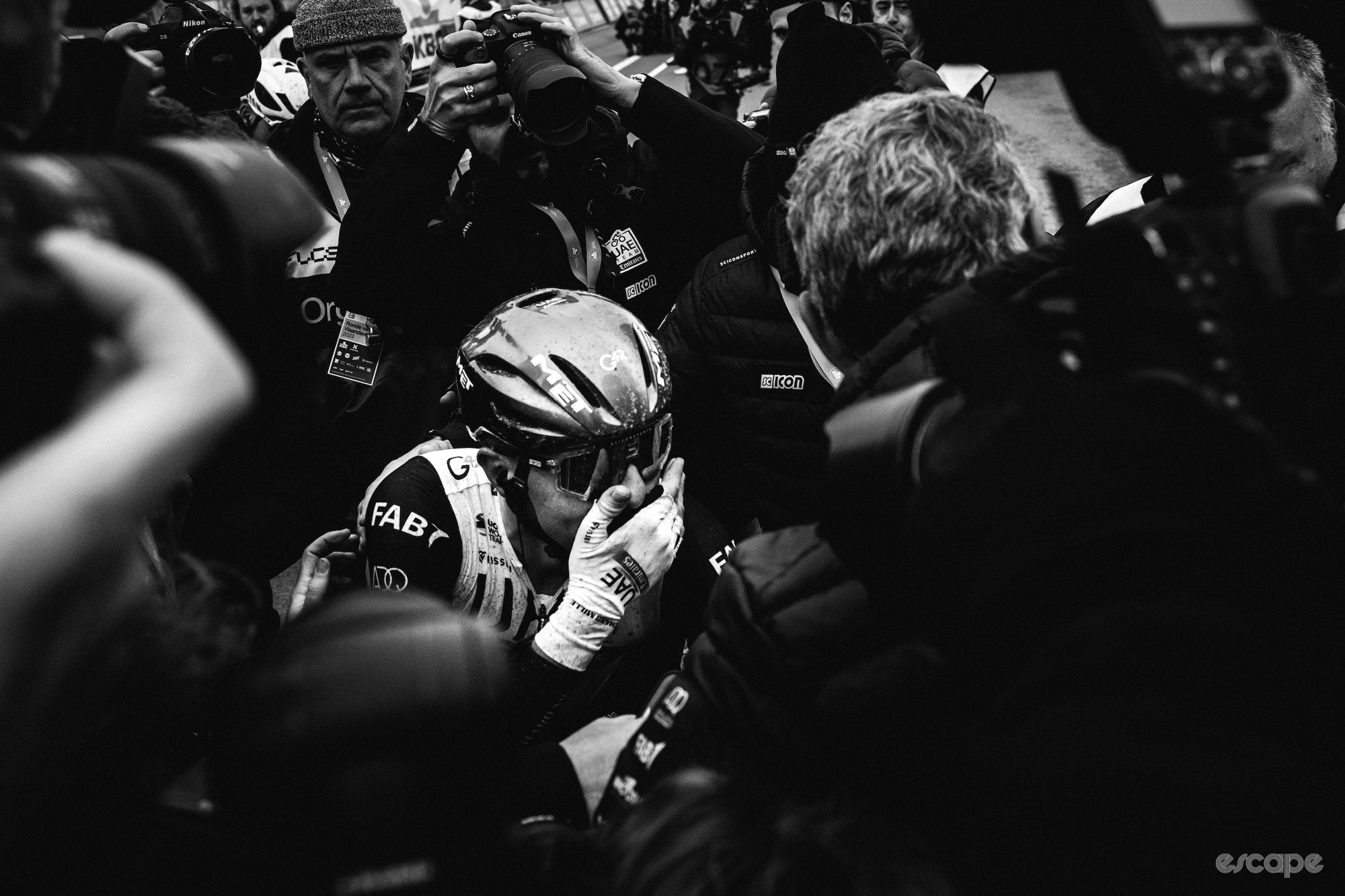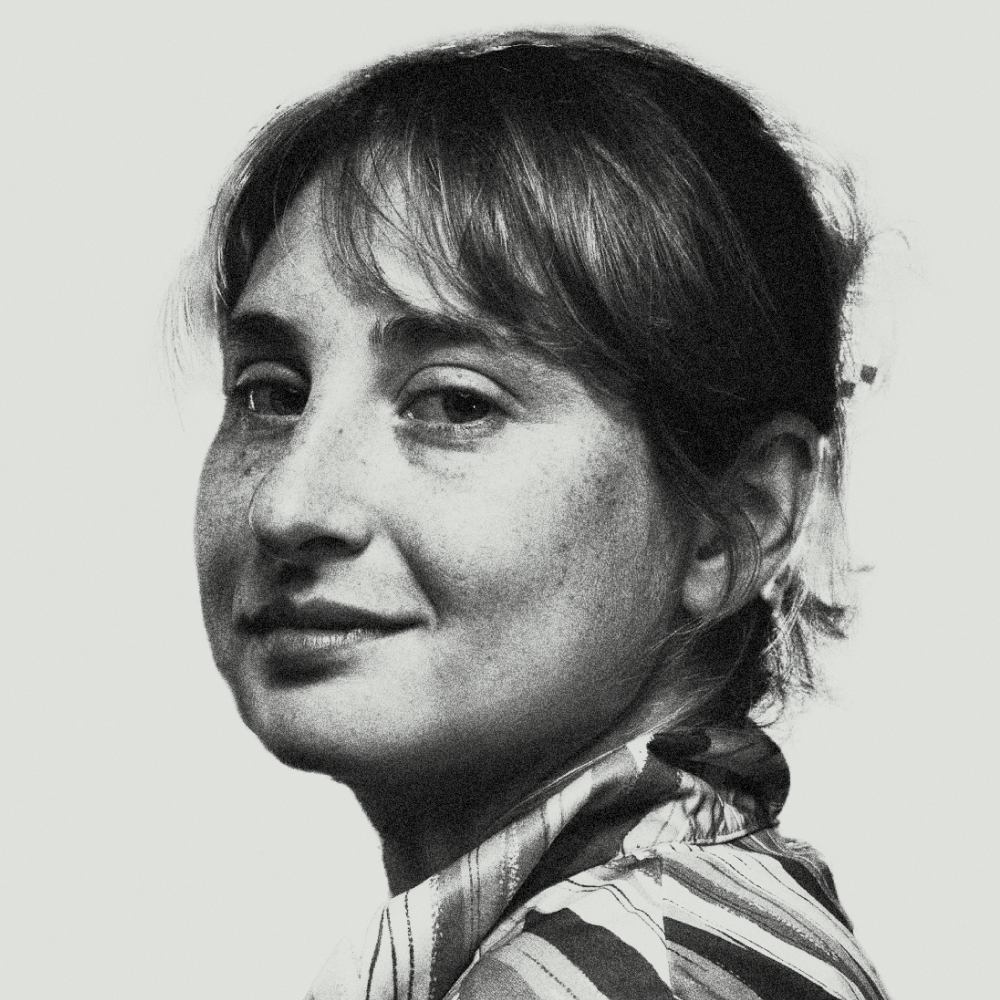The beginning of this story devours the tail of its end. It’s like when I ask in Slovene class zakaj, why something – a word, a phrase – is the way it is, sometimes there is no answer except zato: because, therefore, it is. This story is no different.
It begins with the wind and the dark sky across Flanders, the green fields seeping into horizons on either side of a narrow road. For the riders, the whole day is ahead of them, burdened with potential. It is damp. Not raining, but damp, and the men in their brightly colored cycling kits huddle together, anxious. One darts across the road, another catches him. It is like a game. A very long, very nervous game.
Everyone is playing. One wants to get ahead of the race, the others do not want him to. Then the wind changes direction and they fan across the road in their birdlike patterns, little diagonal lines chopped up into segments, each trying not to be a segment, each realizing that they have gotten caught in something terrifying, which bears the name echelon. There are still over 200 kilometers left in the Ronde van Vlaanderen.
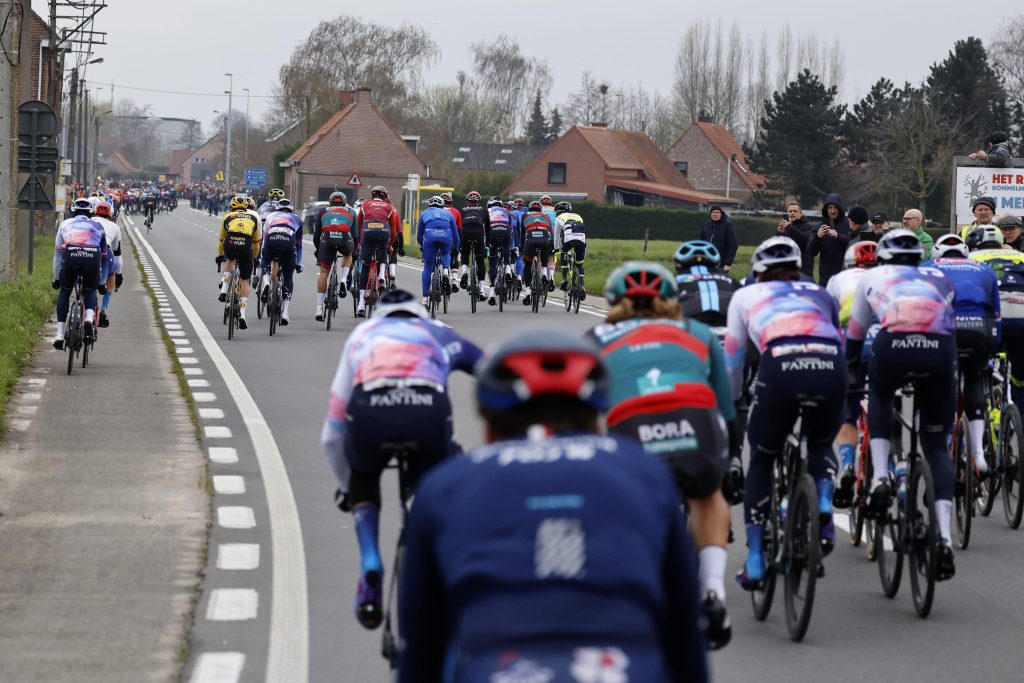
This is the first tug at a narrative string that will unwind across the span of several hours. Around 30 riders are left behind in a chasing group. One of them is the favorite of the day, Mathieu van der Poel, and members of his Alpecin-Deceuninck team. This error shouldn’t be a big deal, right? There’s so much race left, so much road. Then the minutes start passing in a questioning way. It takes an agonizingly long time for the two groups to come back together but they do.
And when there are crashes, some big and horrible and fast, full of the sound of chainrings gnashing, the soft thud of bodies hitting the ground, the groups that are formed come back together. And when the road opens up once more, exposing each resilient creature to the vagaries of the weather, the groups that are formed, come back together. But each group that forms takes so much out of those who must stitch things back together. Men emerge and expire in the same kilometer. It cannot continue like this.
It takes forever for the break to form, to the point where it looks like there won’t be one at all. This constant weaving and dodging and snapping and reclaiming and each of the resulting casualties and mistakes, is a constant generator of pure misery, restlessness, and malaise. When the five riders who go off the front finally do so – none of them are a threat and none will remain by the very end of the day’s proceedings – hours have passed. The peloton relaxes, but only slightly. A race like Flanders is so full of dreams that nothing is ever still.
Finally safe in the peloton, Mathieu van der Poel, sharp as he is, knows that everything is consequential. But it is perhaps more consequential to others than it is to him. He has to believe something like this, otherwise his antics would be more associated with clever self-preservation than they are with spectacle. Churning deep within him is, more than anything, the desire to win at all costs. Those costs are great.
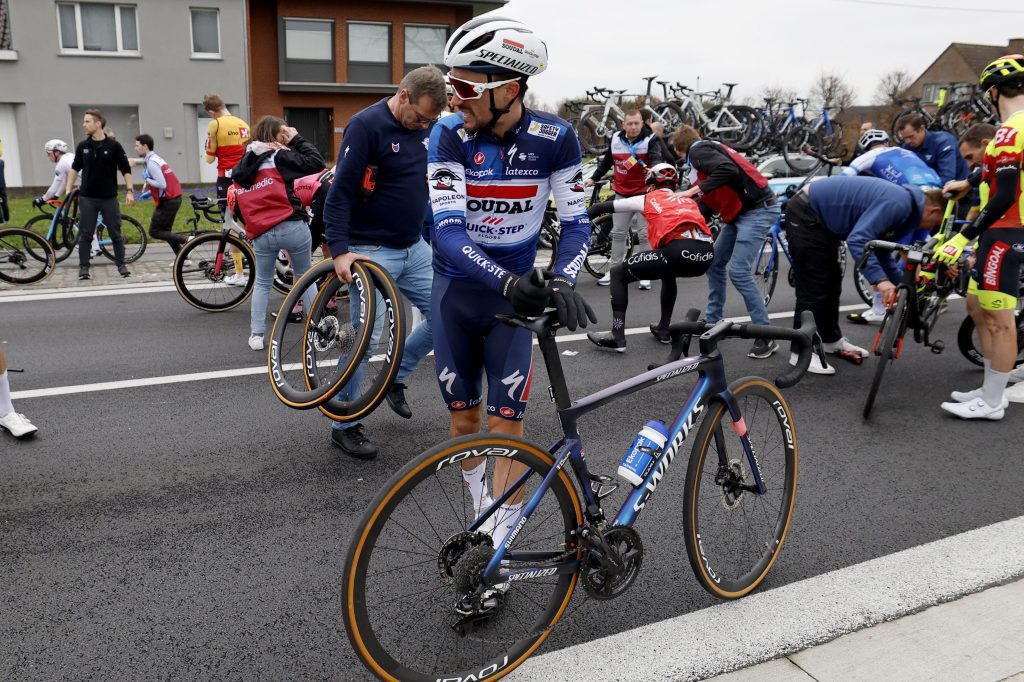
When a stray Bahrain-Victorious rider cuts across the road and takes out half of the peloton, van der Poel survives. When, on the first passage of the slippery Oude Kwaremont, Team DSM grinds everything to such a standstill that riders begin to fall over from lack of momentum, Van der Poel survives. When there are more splits in the peloton and once more Van der Poel is out of position, left as far back as 30 or so seconds, he closes the gap, and survives that too. Each act of perseverance is more incredible than the next. Surely, he must be done for, but somehow he never is.
All of this misfortune must please his rival Wout van Aert, whose Jumbo-Visma team have been making the classics look easy. Just last week in Gent-Wevelgem, after a clever two-up escape, Van Aert gifted his loyal lieutenant Christophe Laporte the win in a display of what could only be described as total dominance. Everything for Jumbo-Visma seems possible, as though the petty squabbles of lesser teams are not their concern. They watch and wait patiently, keeping an eye on Van der Poel as well as the outside threat of Tadej Pogačar, who, in turn, watches Jumbo-Visma.
A certain and powerful desperation seems to seize bike racers at the 100-kilometer mark of an important race. This restlessness manifests in attacks. Ahead of the Marlboroghstraat, a strong group wrests itself free: Fred Wright, Jhonaton Narváez, Matteo Trentin, Neilson Powless, Nathan Van Hooydonck, Stefan Küng, Kasper Asgreen, Mads Pedersen, Florian Vermeersch. They are worth listing here in full because each of them is strong enough to stay out ahead to the end, but especially these: Pedersen, a former world champion; Asgreen, a former Flanders winner; Trentin, a former European champion, each combining their efforts in anticipation of the Big Three.
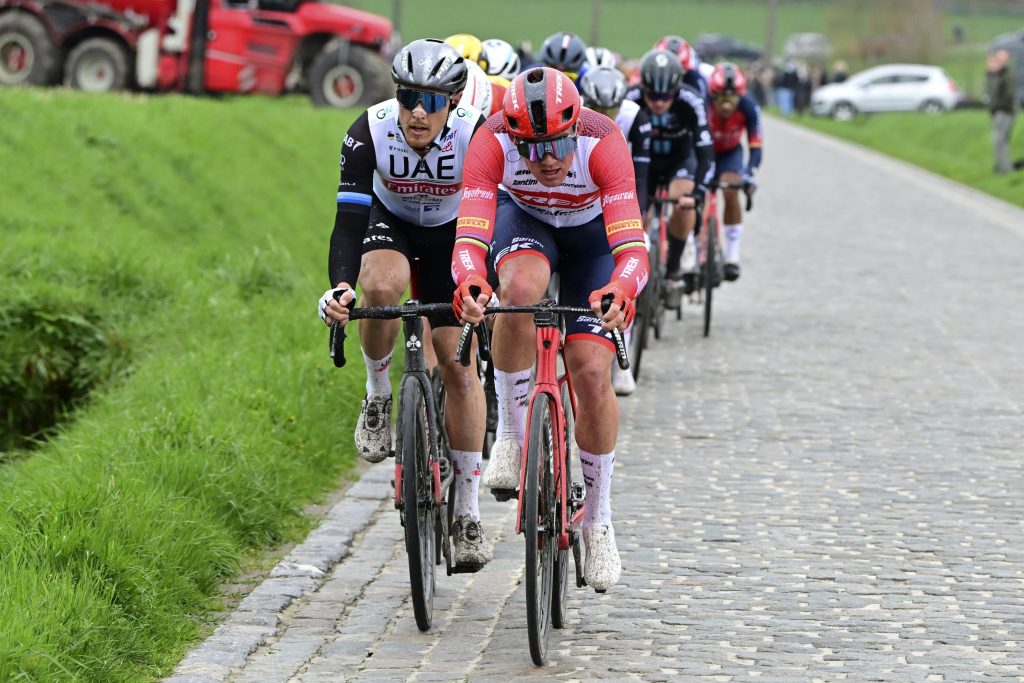
Matteo Jorgenson and Benoit Cosnefroy join them. They, in turn, will join those forgotten few still hanging on up front. No one knows that one of the crashes – and there are many – has claimed Van Aert until he reappears at the front of the peloton with a scraped knee. A gap blooms into three minutes. Fans cheer at the side of the road, lean out of the windows of small Flandrian houses, all white and concrete, their faces young and old, obscured by a neighboring flag or the rogue flare. And then the roads empty themselves of the towns and open back into the fields and the nightmare of the wind comes back to haunt the men ostensibly pursuing the escapees.
But three minutes is too long – the longing for stability has turned into largesse. “Bitter care, my Muse, holds me ever tighter in her grip,” the Slovenian writer Ivan Cankar once wrote, as though he could have predicted the mood in every pursuing peloton. Something had to happen. One of the three men expected to act would have to do so soon. Time passes in thick, tense slices.
The Oude Kwaremont, sacred and horrible. There is certainly a scenario in which that bitter care, that mutual wariness, would destroy the chase – as it so often does. But in the shadow of the Kwaremont, a flurry of white jerseys comes to the front. The prize is simply too big, the circumstances too right – they’ve all worked hard to whittle down the gap to something graspable. Who, of the three, could possibly ignite things? Van Aert has a teammate, Van Hooydonck, in the breakaway, as does Pogačar. Van der Poel has been working all day just to stay in the race, but he weaves across the road time and time again, attached to his opponents like a dog on a chain. It could only be Tadej Pogačar, who aside from a trip to the front a few kilometers earlier, has remained almost invisible.
The contemporary Slovene poet Maja Vidmar has a line that goes like this: “There’s only one fear – / the fear of repetition. / Inscribed on the body.” Inscribed in Pogačar’s legs and heart and mind is the memory of last year, of being alone with Van der Poel, taking turns, watching, waiting, only to be caught in the sprint by the pursuing group and left with nothing. When I spoke at length with Pogačar last year for a profile, I asked him what his favorite race of the season was. Flanders, he said, immediately. “Even though you didn’t win?” I asked. “Yeah,” he replied, with total certainty.
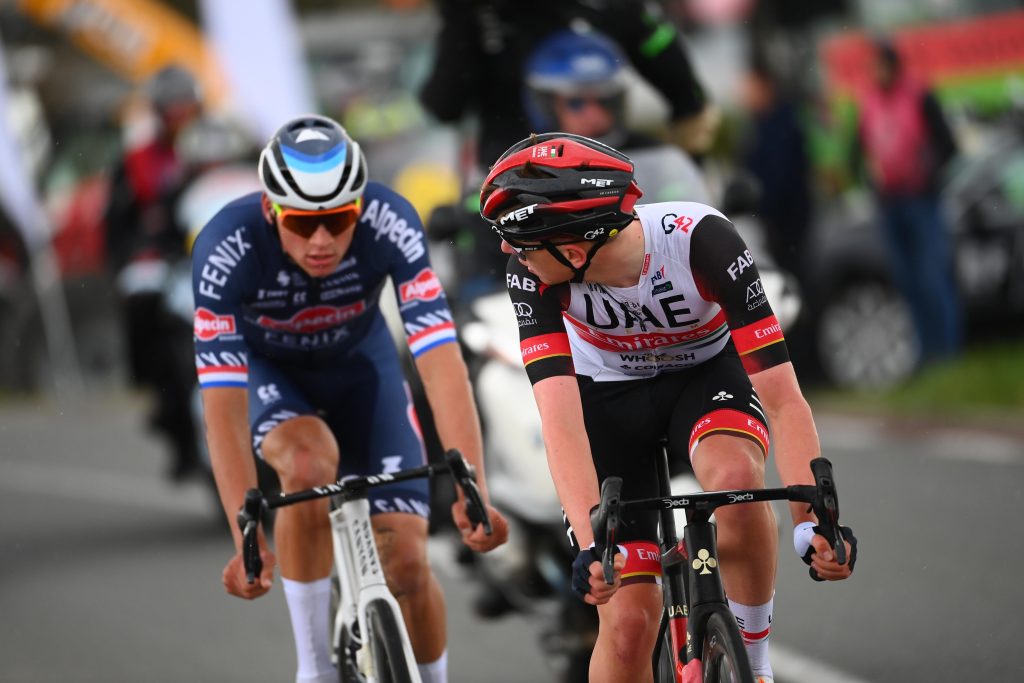
With that same certainty, he stomps on the pedals, a motion rendered inelegant by the blunt edges of cobblestones and, on the Kwaremont, leaps into the space in front of him. Van Aert rallies Laporte. Tom Pidcock peeks his head out for the first time all day. Van der Poel makes a savage jerk of the wheel to try and catch the man out front. They do not catch him. On the steep, grueling Paterberg, they do not catch him either. For everyone behind these men, the race is over.
Laporte owes Van Aert a favor. A sentinel, he is sent to fetch Pogačar, who then comically gestures at Laporte to do a turn. Laporte shakes his head wryly. The strategy works – the others have rejoined them. They wait for the Koppenberg, but on the hellingen, the only riders discarded are Pidcock, on an off day, and Laporte, who’s spent. Meanwhile, somewhere up front, on the Steenbeekdries, Küng gets word that the Vans and Pogačar are a minute behind. He pushes the pace, tries to force a split, but his companions are wary. Trentin and Van Hooydonck, their teammates behind, stop working. Others simply give up, are shelled out the back on the various cobbles and climbs. What once seemed so certain has become fragile.
The climbs come, as Rob Hatch likes to say, thick and fast now. The Taaienberg. Van der Poel shifts hard but something moves at the wrong time and he almost drops his chain. He falls behind instantly. But he is Mathieu van der Poel, so even though he has already braved through the wind and the rain and the crashes and all kinds of tactical mishaps, he digs ferociously deep into whatever reserves he has left and finds Van Aert and Pogačar once more, caring little about the costs, the debt to his body he will have to repay later. The big three begin to collect the others – Cosnefroy, Narvaez. Their long, inevitable procession towards the breakaway continues.
Each must be sick with wondering when the final reckoning will come. Each feels that malaise in their own way. Van Aert has never won this race – he has tried and has come close; he has had terrible luck or some Covid mishap or, in 2020, he simply got outsprinted by Van der Poel. His team is a menace to the rest of the peloton. He managed to survive the others’ tactical blunders but still fell prey to a slip of the wheels at no fault of his own. Van der Poel, as mentioned, has come back from the dead so many times already today that he surely must be running low on matchsticks to burn. Pogačar, however, is perhaps the most disadvantaged. He knows he cannot beat the other two in a sprint, has openly acknowledged as much. He will have to make some kind of clever, devastating move. He will have to break the spirit of his companions, two men not very well known for being breakable.
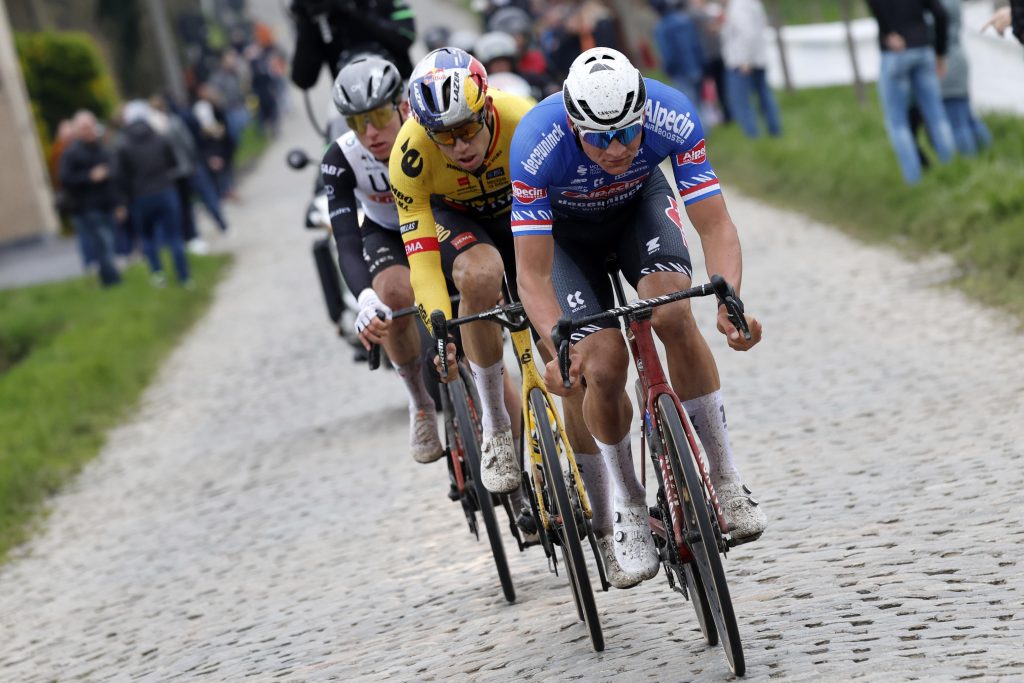
Ahead of the Kruisberg, Mads Pedersen, like Küng before him, senses that he may be in a situation that’s going nowhere. He picks a novel place to attack, on the straight ahead of a corner, uses the speed he’s gathered to disappear, and uses the cobbles to make himself scarce. He’s wise to do so, for on the Kruisberg, the worst comes true for the breakaway. The big three are closing in.
In some respects, the playing field is as level as it will ever be for these three men. Van der Poel is tired. Van Aert, slightly injured. Pogačar, smaller and alone. Which will succumb to the race first is a total toss up. Van der Poel kicks. Pogačar goes with him. It is, perhaps most unexpectedly, Van Aert who sinks like a stone, watches forlornly as the other two go ahead without him. It is a sad moment, a lonely moment. In a cruel, ironic sense, it is a Poulidorian moment, the Ronde always seemingly just out of reach for one of the riders most expected – by his countrymen, his team, his rivals, and himself – to win it.
24 kilometers to go. The Kwaremont looms again. Pogačar and Van der Poel pick up Florian Vermeersch on their way to the breakaway. Van Hooydonck slows and waits for Van Aert in an attempt to try and help his beleaguered leader stay in the race. But no one is looking behind. The cobbles are starting. By this point the Kwaremont must feel bone-shattering. Pogačar senses the exhaustion of the others. He is most likely exhausted himself. His shorts are stained with mud and his jersey damp with sweat. This is his last remaining moment, however, and he knows this and when he attacks for the final time, the others know this also. Pogačar catches Pedersen and drops him too. All that is left is the Paterberg and then the open road.
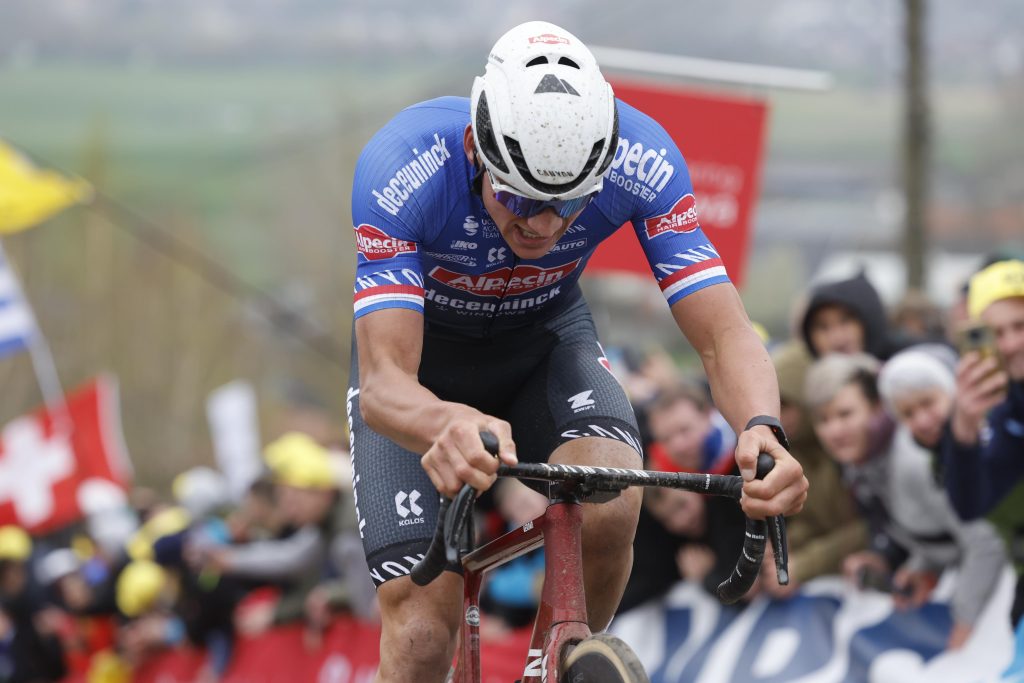
Van der Poel looks absolutely wrecked, but despite all of his bad luck and all of the circumstances leading to this very moment, he simply refuses to give up. He, too, passes Pedersen, wrests all he can out of his legs to try and catch Pogačar. On the Paterberg, the gap is only around 10 seconds. But the fear of repetition is inscribed on the body, and Pogačar’s depths go just a little bit deeper, he strives just a little bit harder, he’s saved up just enough to make sure that the situation he found himself in last year would not manifest itself in the present. It is a time trial now, toward the finish line in front of him and against Van der Poel behind.
For the longest time, I don’t think Pogačar actually believes that he’s finished this. He looks back over his shoulder. He shifts uncomfortably on the bike, his calves and his wrists and probably even his teeth are sore from the day out he’s had. It’s an ache that seeps into one’s marrow. The sun does not come out. The road does not feel any shorter. Van der Poel watches Pogačar up the road. He can see him.
That’s the hardest part. He can see him as a quivering moving dot on the horizon, rounding a corner, disappearing, reappearing seemingly even farther away. He looks behind and sees the others too, including van Aert and Pedersen now all together. He is in no man’s land. He keeps pushing and pushing and pushing, but the gap is now 15, 20, then 30 seconds. They are moving within two different temporalities that will not converge.

Tadej Pogačar is not making any flashy gestures towards the camera moto. He is not laughing. His face, until he sees the finish line, is bereft of its usual brightness. Only in the last 300 meters does he know the monumentality of what he’s achieved and only then does his mouth burst into a smile. His arms extend into the air. If you consider the sum total of what had happened before, starting with the opening crosswinds and all the chaos and bravery that followed, you will see a certain kind of inevitability great events often come with in retrospect. The sense that it could not be otherwise.
Only three people in history have won the Tour de France and the Ronde van Vlaanderen. They are Louison Bobet, Eddy Merckx and Tadej Pogačar. Only two people have won three different monuments before the age of 25. They are Eddy Merckx and Tadej Pogačar. The decades between those two men are a chasm so vast it is as though it could never be bridged with any kind of historical continuity – the sport is too different, the technology is too improved, the stakes are too high, the field is too open. Until it isn’t. And it isn’t anymore. Zakaj? Zato. Tadej Pogačar doesn’t just leave Flanders today with a victory. He leaves with history, too.
Did we do a good job with this story?
